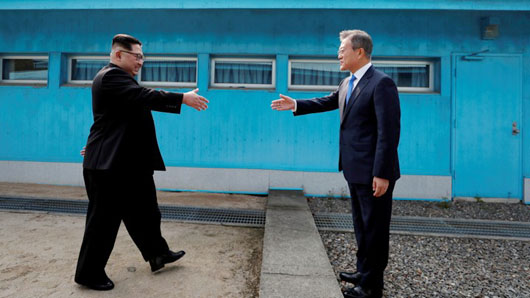by WorldTribune Staff, October 22, 2018
The U.S. Treasury Department said it has notified South Korean banks that “UN and U.S. sanctions on North Korea remain valid” after media reports surfaced saying the South was planning renewed financial cooperation with the North.
A document drafted by South Korea’s Financial Services Commission (FSC) that was released on Oct. 22 after a parliamentary audit, reveals the Treasury Department directly called South Korean banks over the matter, Reuters reported.

An unidentified deputy assistant secretary at the Treasury Department’s Office of Terrorism and Financial Intelligence called executives in charge of compliance at seven South Korean banks, according to the document.
Media reports indicated that South Korean financial institutions were preparing to re-open branches within North Korea or establish task forces and working groups to support inter-Korean economic cooperation, according to the document, excerpts of which were released by the office of South Korean opposition lawmaker Kim Seon-Dong.
Such “resumption of financial cooperation with North Korea … does not align with U.S. policies,” the Treasury official said, according to the document.
Related: Pro-North subterfuge at highest levels in Seoul unreported by suppressed media, Oct. 16, 2108
The official also expressed “deep concern” that the banks had misunderstood their duties “to comply with UN and U.S. financial sanctions on North Korea,” according to the document, which was drafted in Korean.
An Industrial Bank of Korea (IBK) spokesman said it was watching events and could re-consider inter-Korean cooperative projects in the future.
NongHyup Bank, an affiliate of the National Agricultural Cooperative Federation, was “internally considering reopening its Mount Kumgang branch with consideration for UN and U.S. sanctions on North Korea,” the bank’s president, Lee Dae-hoon, told a parliamentary audit last week. The branch at the North Korean scenic spot has been closed since 2009.
Woori Bank, which had a branch in the Kaesong industrial complex in North Korea before withdrawing in 2016, confirmed that there was a call from the U.S. Treasury Department, but declined to elaborate.
More than 80 percent of all South Korean imports and exports payments are made in dollars, according to South Korean central bank data, and many go through accounts of major banks in the United States, bank officials said.
“The fact that Treasury has warned the South Korean banks will be strong evidence that further actions are wilful when the U.S. authorities decide what legal actions are appropriate and winnable,” said Joshua Stanton, an American lawyer who runs the site One Free Korea, adding that institutions could face a combination of civil penalties and forfeitures.
“That would do serious damage to any bank’s stock price and Moody’s rating, could cause other banks to de-risk the South Korean bank and cut off correspondent relationships, and have serious impacts on South Korea’s already stressed economy,” Stanton said.
A senior official at South Korea’s presidential office, asked about the possibility of discord with the United States over sanctions, said the two countries would “eventually be on the same path” towards denuclearization though there might be a “procedural difference.”
While insisting it has been in lock-step with the U.S. on North Korea, the administration of South Korean liberal President Moon Jae-In has moved forward with efforts to engage with the North, drawing U.S. concern over a range of issues, from sanctions enforcement to plans for a no-fly zone between the two Koreas, the Reuters report said.
Subscribe to Geostrategy-Direct __________ Support Free Press Foundation
